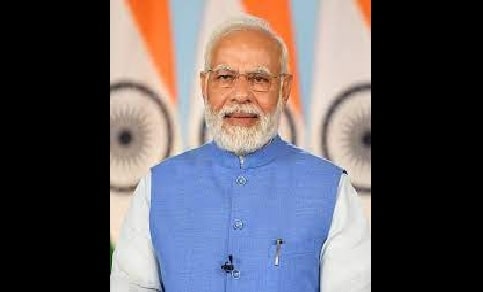

The Prime Minister, Shri Narendra Modi addressed the inaugural session of the Global Buddhist Summit at Hotel Ashok in New Delhi on Thursday.
The Prime Minister walked through the photo exhibition and offered flowers to the Buddha statue. He also offered monk robes (Chivar Dana) to nineteen eminent monks. Union Minister for Culture, Shri G Kishan Reddy, Union Minister for Law and Justice, Shri Kiren Rijiju, Union Ministers of State for Culture, Shri Arjun Ram Meghwal and Smt Meenakshi Lekhi, and Secretary General of International Buddhist Confederation, Dr Dhammapiya were present on occasion.
The two-day Summit is being hosted by the Ministry of Culture in collaboration with International Buddhist Confederation on 20-21 April. The theme of the Global Buddhist Summit is “Responses to Contemporary Challenges: Philosophy to Praxis”. It is an effort towards engaging the global Buddhist Dhamma leadership and scholars on matters of Buddhist and universal concerns, and to come up with policy inputs to address them collectively. The discussion at the Summit explored how the Buddha Dhamma’s fundamental values can provide inspiration and guidance in contemporary settings.
Addressing the gathering, the Prime Minister welcomed everyone from different corners of the world to the inaugural session of the Global Buddhist Summit. “Buddha is beyond the individual, it is a perception”, and Buddha is a sensation that transcends the individual, he is a thought that transcends form and Buddha is a consciousness beyond manifestation. “This Buddha consciousness is eternal”, the Prime Minister said. Noting the occasion, he expressed confidence that the inaugural Global Buddhist Summit will create an effective platform for the efforts of all nations and thanked the Ministry of Culture and International Buddhist Confederation for this momentous event.
The Prime Minister credited the teachings of Lord Buddha for an inherent empathy in India for the issues of humanity. He mentioned peace missions and India’s whole-hearted efforts in rescue work for disasters like the earthquake in Turkiye. “This emotion of 140 crore Indians is being seen, understood and accepted by the world”, he said. Platforms like IBC, he continued, are giving the opportunity to like-minded and like-hearted countries to spread Buddha Dhamma and peace.
Click here for full text of PM speech
On the occasion , Minister of Culture, Tourism and Development of North-Eastern Region Shri G Kishan Reddy said that it is a matter of pride for all of us that the Global Buddhist Summit is being inaugurated by the Prime Minister of India, Shri Narendra Modi. He informed that the theme of this two-day Global Buddhist Summit is ‘Responses to Contemporary Challenges- Philosophy to Praxis’. About 170 International Delegates from more than 30 different countries of the world are participating in this Global Buddhist Summit. The two day Global Buddhist Summit will discuss topics like Peace, Environment, Morality, Health, sustainable development and Buddhist Confederation. The Global Buddhist Summit is an initiative of the Modi government and it will help in strengthening our cultural and diplomatic relations with the world, the Minister added. He said that Prime Minister has said that major challenges of the world can be solved by Buddhist philosophy of life and I think the Global Buddhist Summit will be a successful effort in that direction.
On the occasion, Union Minister of Law and Justice Shri Kiren Rijiju said that the support from the Mahā Sangha, world over and the Supreme Patriarchs, Sangha Nayakas, Meditation Masters, various Buddhist Associations, Monastic body, learned Buddhist Scholars have brought us to this historic Day when we are all witnessing this auspicious Day happening. I am glad to know the theme of this Global Buddhist Summit is – ‘Responses to Contemporary Challenges - Philosophy to Praxis’ and that the Summit is divided into two separate parallel sessions – a Sangha Session and an Academic Session with several diverse sub-themes, such as, Buddha Dhamma and Peace, Environmental Crisis, Health and Sustainability, Preservation of Nalanda Buddhist Tradition, Buddha Dhamma Pilgrimage, Living heritage and Buddha Relics etc”. He also congratulated all the members of the International Buddhist Confederation to make it Successful.
He also said " Buddha Dhamma is not just a religion; it is a way of life that emphasizes compassion towards all beings. The teachings of impermanence and interdependence remind us that everything in the world is changing and are interconnected, and we must learn to live in a way that is sustainable and respectful of the earth and its resources. "
On the occasion, an exhibition, the Panch Pradarshan, the celebration of Five Exhibitions was organised as part of the two-day Global Buddhist Summit on the theme, “Responses to Contemporary Challenges: Philosophy to Praxis"
These depict the 10-years of IBC’s journey, the rich cultural legacy of Buddha manifesting in the heritage of Vadnagar city, Gujarat, travel accounts of Buddhist pilgrim Xuanzang, work of Buddhist religious leader and master Atisa Dipankara Srijana, and Digital Restoration of Ajanta Paintings showcases the process involved that goes into the digital restoration of cultural artifacts through the example of the digital restoration of the cave painting of Padmapani (Ajanta Ellora).
The programme started with the offering of flowers to the Buddha statue by the Prime minister while the Mangalacharan was being recited.Dr Subhadra Desai gave a classical rendering of the Ratana Sutta.
The Summit witnessed the participation of eminent scholars, Sangha leaders and Dharma practitioners from all over the world, who will discuss pressing global issues and look for answers in the Buddha Dhamma based on universal values. The discussions were held under four themes: Buddha Dhamma and Peace; Buddha Dhamma: Environmental Crisis, Health and Sustainability; Preservation of Nalanda Buddhist Tradition; Buddha Dhamma Pilgrimage, Living Heritage and Buddha Relics: a resilient foundation to India’s centuries-old cultural links to countries in South, South-East and East Asia.